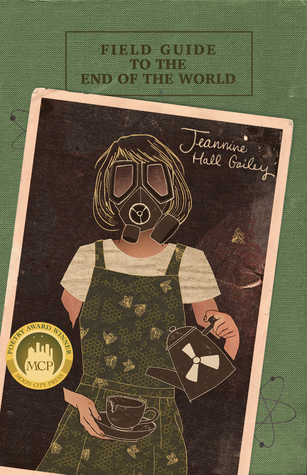
Paperback, 72 pgs.
I am an Amazon Affiliate
Field Guide to the End of the World by Jeannine Hall Gailey, which is the winner of the 2015 Moon City Poetry Award, is nothing short of phenomenal. While Gailey often puts herself in her poems, there are times when she adopts personas to create poems of female empowerment. This collection has a similar fantasy style (including a moment with Wile E. Coyote, Super Genius) to it with a post-apocalyptic setting, but it also is vastly more personal. While some of the poems may be a bit tongue-in-cheek about death (see “In Case”) and the end of the world and how duct tape is a miracle survival tool, underneath those quips is the seriousness that imminent danger and possible death bring.
She hints in “Introduction to Mutagenesis” that these genetic missteps could be changes we do not understand and that we may need them to survive in the evolving world. It is this kind of hope in the face of despair that is unexpected and inspiring.
Errors in replication — beyond our control — and yet sometimes the systemic destruction
of a certain cell might lead to a breakthrough, a land mass not yet discovered inside us,clever adaptations that let us survive genetic drift in cases of plague or flood,
carriers of one disease not susceptible to another, …
In our own “black boxes”, our cells tell our history, the lives we’ve led, the deaths we’ve faced, and what finally takes us to the grave, she says in “Every Human Is a Black Box.” None of us have “turnkey solutions” and would we want to — would we want that kind of predictability? Even if the prospect of death or battling cancer is frightening, even paralyzing, would we want the solution to be simple? It would seem that kind of world would be less precious, less of a marvel.
From “Introduction to Spy Narrative as Love Story” (pg. 21)
When I look in a mirror all I see is you
written across my body like the shadow of a blackbird
Gailey’s verse is unique, haunting, and cheeky, but at its heart, her poems teach us that to live is to take the good and bad together and laugh, enjoy life, savor it. Even if the apocalypse is upon you, it is not the time for wallowing in sadness and self-pity, but a time for you to rise up beyond your circumstances and find a way to survive. From “Shorting Out” (which is just gorgeous in its use of white space) to “At the End of Time (Wish You Were Here)”, readers are reminded of the fragility of the mind, of memory, especially when “40 years of learning were leaking through the lesions.” (from “At the End of Time (Wish You Were Here)”).
Field Guide to the End of the World by Jeannine Hall Gailey, which is the winner of the 2015 Moon City Poetry Award, is a guidebook for living, for more than survival in a world about to end. She asks us to remember not to be lonely in the woods, not to be frightened of bears because “There’s the comfort of the knocking on hollow/branches, the scratching song of insects, and those tubes/of sunlight that show up on the path, lighting the way.” (from “Remnant”).
RATING: Cinquain
Other Reviews:
- Becoming the Villainess
- Unexplained Fevers
- The Robot Scientist’s Daughter
- Interview with Jeannine Hall Gailey
- Interview #2 with Jeannine Hall Gailey

Jeannine Hall Gailey served as second poet laureate of Redmond, Washington. She’s the author of four previous books of poetry: Becoming the Villainess, She Returns to the Floating World, Unexplained Fevers, and The Robot Scientist’s Daughter. Her work has been featured on Verse Daily and NPR’s The Writer’s Almanac, and included in The Year’s Best Fantasy and Horror.





I want tot read this!
Wow, I can tell how much you love this!
It is fantastic!
From your review, I can tell why it’s an award winner!
It is deserving for sure
Terrific review, Serena! I’m glad you enjoyed this “unique, haunting, and cheeky” collection of poetry. I am excited to be on this tour next month! 🙂
This is a wonderfully written collection. I hope you enjoy it.